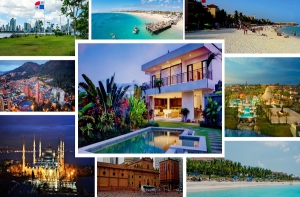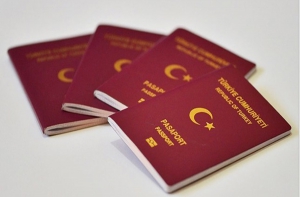
Outlook to Turkish Economy
Turkey’s economy has performed remarkably well with its steady growth over the past 14 years. A sound macroeconomic strategy, prudent fiscal policies, and major structural reforms have all contributed to the integration of Turkey’s economy into the globalized world while also transforming the country into one of the major recipients of FDI in its region.
These reforms have increased the role of the private sector in Turkey’s economy, enhanced the efficiency and resiliency of the financial sector, and placed public finance on a more solid foundation. These reforms strengthened the macroeconomic fundamentals of the country, allowing the economy to grow at an annual average real GDP growth rate of 5.6 percent from 2003 to 2016.
Annual Average Real GDP Growth (%) 2003-2016

Source: OECD Quarterly National Accounts, 2017
Turkey’s impressive economic performance over the past 14 years has encouraged experts and international institutions to make confident projections about Turkey’s economic future. For example, according to the OECD, Turkey is expected to be one of the fastest growing economies among OECD members during 2015-2025, with an annual average growth rate of 4.9 percent.
Annual Average Real GDP Growth (%) Forecast in OECD Countries
2015-2025 (USD at 2010 PPP)

Source: OECD
Together with stable economic growth, Turkey has also reined in its public finances; the EU-defined general government nominal debt stock fell to 28.3 percent in 2016 from 72.1 percent in 2002. Turkey has been meeting the “EU’s 60 percent Maastricht criteria” for public debt stock since 2004. Similarly, during 2003-2016, the budget deficit decreased from more than 10 percent to less than 2 percent as a ratio to GDP, which is one of the EU Maastricht criteria for the budget balance.
As the GDP levels increased to USD 857 billion in 2016, up from USD 236 billion in 2002, GDP per capita soared to USD 10,807, up from USD 3,581 in the given period.
The visible improvements in Turkey’s economy have also boosted foreign trade. Exports reached USD 143 billion by the end of 2016, up from USD 36 billion in 2002, while tourism revenues, which were around USD 12.4 billion in 2002, exceeded USD 22 billion in 2016.
Significant improvements in such a short period of time have registered Turkey on the world economic scale as an exceptional emerging economy. It is the 17th largest economy in the world and the 6th largest economy when compared with the EU countries, according to GDP figures in 2016.
- Institutionalized economy fueled by USD 180 billion of FDI in the past 14 years
- 17th largest economy in the world and 6th largest economy compared with EU countries in 2016 (GDP, IMF)
- Robust economic growth with an annual average real GDP growth of 5.6 percent during 2003-2016
- GDP reached USD 857 billion in 2016, up from USD 236 billion in 2002
- Sound economic policies with prudent fiscal discipline
- Strong financial structure that is resilient to global financial crises
Turkish Real Estate Market
Turkey is one of the most promising real estate markets in Europe, and the mantra “location, location, location” rings especially true for this country. Strategically situated at the crossroads of Europe, the Middle East, and Central Asia, and home to almost 81 million people, Turkey offers great opportunities for real estate developers and investors by combining a large construction sector with growing commercial and industrial output.
Some key facts and figures in the Turkish real estate sector include:
- The real estate sector accounted for approximately 8.4 percent of GDP in the last decade. On the investment side, FDI inflows stood at USD 10.8 billion, with real estate and construction garnering USD 4.6 billion (42.9 percent) of total FDI in 2017.
- Urban renewal and mega projects dominate the agenda for the foreseeable future, particularly in Istanbul. Some projects in the city include Marmaray, Canal Istanbul, Yavuz Sultan Selim Bridge, Eurasia Tunnel, 3-Storey Grand Istanbul Tunnel, and Istanbul’s 3rd airport.
- The Urban Renewal and Development initiative will encompass 7.5 million housing units. The initiative has a budget of USD 400 billion, with a large contribution coming from the private sector.
- According to the Knight Frank Global House Price Index, Turkey ranked 6th in the 56-location index in Q3 of 2017 in terms of the annual price growth index. Turkey saw a year-on-year increase of 11.1 percent, and thus emerged as one of the top-performing housing markets in the world, ahead of Australia, Latvia, and India.
- The total number of houses sold in the Turkish property market reached 1.4 million units in 2017; likewise, sales of real estate to foreigners began to increase following the abolishment of the reciprocity law in 2012. In 2017, 22,234 houses were sold to foreigners in Turkey, marking a year-on-year increase of 22.2 percent. Regarding house sales to foreigners, Istanbul was the top-performing province with 8,182 sales in 2017, followed by Antalya with 4,707 sales, Bursa with 1,474 sales, and Yalova with 1,079 sales.
- As of 2017 year-end, the existing Grade A office stock in Istanbul surpassed 5.3 million square meters across 249 office buildings. Annual gross leasable area growth in the office market was around 12 percent on average between 2010 and 2017. There is more than 1.2 million square meters of office supply under construction, and it is expected that the total grade A office supply will reach almost 7.1 million square meters gross leasable area by the end of 2020.
- 401 shopping centers are operational in Turkey with a total gross leasable area of 12.2 million square meters. 114 shopping centers in Istanbul with a total gross leasable area of 4.2 million square meters represent 34 percent of the total leasable shopping center area in Turkey.
- According to JLL’s Cross Border Retailer Attractiveness Index 2016, Istanbul is the 6th most attractive market in Europe after London, Paris, Moscow, Milan, and Madrid.
- In spite of the growth in recent years, Turkey is still below the average of total leasable area per person compared to the European average. This indicates potential for further retail growth in Turkey.
- According to the Ministry of Culture and Tourism Directorate, Turkey has 3,641 graded hotels with a total of 426,981 rooms as of 2016 year-end. 5-star hotels account for 42.7 percent of hotel stock, while 4-star hotels secure a 24.8 percent share, and the 3-star segment makes up 12.6 percent of the market share.
Turkish Citizenship Conditions
Getting Turkish Citizenship conditions for the foreign investors;
❖ who make fixed capital investment at least 500.000 US Dollars or equivalent foreign currency or equivalent amount of Turkish Lira and for whom certificate of conformity is issued by the Ministry of Industry and Technology,
❖ who purchase the immovable property at least 250.000 US Dollars or equivalent foreign currency or equivalent amount of Turkish Lira and attached annotation at land registration not to sell this property for three years and for whom a certificate of conformity is issued by the Ministry of Environment and Urbanization,
❖ who employ at least 50 employees and for whom a certificate of conformity is issued by the Ministry of Family, Labor and Social Services,
❖ who invest at least 500.000 US dollars or its equivalent in foreign currency or equivalent amount of Turkish Lira and make commitment to hold the amount of deposits for three years at banks operating in Turkey and for whom a certificate of conformity is issued by the Banking Regulation and Supervision Agency,
❖ who purchase public borrowing instruments at least 500.000 US Dollars or equivalent foreign currency or equivalent amount of Turkish Lira and make commitment to hold these instruments for three years and for whom certificate of conformity is issued by the Ministry of Treasury and Finance,
❖ who purchase a real estate investment fund participation share or venture capital investment fund participation amount of at least 500.000 US Dollars or equivalent foreign currency or equivalent amount of Turkish Lira and make commitment to hold these participation shares for three-years and for whom a certificate of conformity is issued by the Capital Market Board,
In order to;
ü Make the process of acquiring Turkish citizenship more efficient and faster,
ü Provide services in support, consultancy and application tracking processes from the application for residence permit (6458-31/J) to the acquisition of Turkish citizenship,
ü Provide quality service with qualified personnel working in manner of "customer representative",
ü Maintain foreign investors, who do not have a certificate of conformity, to contact with the relevant determining institutions and to direct them to the designated contact persons,
Operations have been started to provide faster service by establishing “special/joint offices”, mainly in Ankara and Istanbul.
Moreover, the documents requested for foreign citizens to acquire Turkish citizenship and the documents requested separately in citizenship applications were simplified in "private/common offices"; so residence permit and citizenship application shall be obtained at once together with the jointly determined documents.
Feel free to contact us if you have any questions.
About Company
With an experienced team that includes engineers, academics, architects, lawyers, and financiers, Sarvas Company provides consulting service for Real Estate, Building, Energy, and Agriculture in the Turkish market. We can help you with your application for Turkish citizenship by following the process on your behalf.







